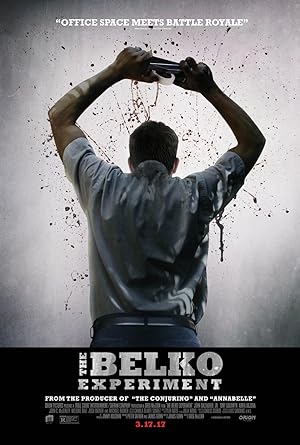When a friend and I saw the trailer for The Belko Experiment, we were sold, but I did not get to the theater as quickly as my friend so I missed its surprisingly short theatrical run. I thought that I would finally get what I felt like I did not get when I watched Severance: a biting horror movie that took cutthroat office politics to its most extreme and natural conclusion. Also my fundamentalist upbringing felt vindicated at my Mark of the Beast suspicions at microchip implants. Combined with my love of Hannah Arendt, Experimenter: The Stanley Milgram Story and The Stanford Experiment, I probably built the film up too much for the real deal to measure up.
Remember that I watch too many movies and feel free to judge, but I thought that John Wick was too boring, and John Wick: Chapter 2 was perfect. I thought that The Belko Experiment would be immediately brutal, but thought it was more tentative and predictable than I expected it to be, particularly the ending, which is begging for a sequel. I hope that like The Purge, if this film turns into a franchise, subsequent iterations are better.
The Belko Experiment gets a few things right: Orwellian corporate double speak; rationalization of evil and prioritizing certain types of people by race, class, marital status, physical ability, age; the understated humor. The soundtrack was brilliantly familiar, subversive and surprising. The cast is brilliant.
Unfortunately the pacing was uneven-too deliberate then rushed. We started out with eighty people, but as the ultimatum increased the number of desired casualties, I’m not sure if the math adds up. I was hoping that the new girl and human resources guy’s storyline would be more provocative, but it felt like the focus was forced back to the conventional, bigger stars. I need movies to stop making characters drop a weapon immediately after using it, especially in films like this one when you are definitely going to need it again. How did they track the new girl if she did not have a chip yet? How did they get radio reception if there was no cell phone service?
The Belko Experiment wants to have its cake and eat it too. The film clearly indicates who we are supposed to disapprove of and what type of violence to find distasteful while simultaneously giving us a revenge fantasy where we can cheer characters being violent, but without sin because acting out of self-defense or in an attempt to avenge explicit wrongs. In a sense, we are a part of the experiment, as guilty as when we watched The Truman Show for our lust to see what happens. I think the film ultimately punked out by giving us a type of happy ending. What was so subversive about reality shows like Survivor is usually the villain wins, and if the brutality of the experiment is supposed to mirror how people rise to the top of any organization, it is rarely the altruistic people.
I will watch a sequel if there was one, but I was not invested in the final survivor so that will temper my excitement next time. I suppose there is some pleasure in seeing a benign, unrealistic everyman broken down to the most primal instincts and human reactions to loss, but it rang hollow to me. I think that we needed an anti-hero that we did not see coming, a person who was equally plausible as venal and harmless. The Belko Experiment flinched from being truly nihilistic and rooted in reality. The news is more nakedly horrifying.
Stay In The Know
Join my mailing list to get updates about recent reviews, upcoming speaking engagements, and film news.





